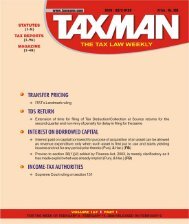CPT V24P7-Art1 (Content).pmd - Taxmann
CPT V24P7-Art1 (Content).pmd - Taxmann
CPT V24P7-Art1 (Content).pmd - Taxmann
You also want an ePaper? Increase the reach of your titles
YUMPU automatically turns print PDFs into web optimized ePapers that Google loves.
Direct Tax Laws<br />
If the powers of Ld. CIT(A) can extend to<br />
enhancement of income by identifying new sources<br />
of income or incorrect deductions or allowances,<br />
then it would be equally applicable to justified<br />
claims of deductions and exemptions if available<br />
to the assessee in accordance with law. Therefore,<br />
there is not only an existence of jurisdiction in<br />
CIT(A) for entertaining new claim, but also a<br />
clear discretion vested in him to admit the<br />
claim, get it verified, give opportunity to the<br />
A.O. and decide it according to law.<br />
Even though in an earlier decision of the Apex<br />
Court in Addl. CIT v. Gurjargravures (P.) Ltd.<br />
[1978] 111 ITR 1 it was held that a claim not<br />
made before the A.O. could not be made even<br />
before the first appellate authority but there<br />
was a rider in that decision. It was observed<br />
that if there was no material on record in support<br />
of the claim, the claim could not be made for<br />
the first time before the appellate authority.<br />
This decision was apparently per incurium as<br />
attention of the Court was not drawn to the<br />
principles laid down by the Apex Court in CIT<br />
v. Kanpur Coal Syndicate [1964] 53 ITR 225 wherein<br />
it was held that the powers of AAC are plenary<br />
in disposing of an appeal and scope of his<br />
power is co-terminus with that of the ITO and,<br />
therefore, he can do what the Income-tax officer<br />
can do and can also direct him to do what he<br />
has failed to do. When this principle is applied,<br />
the AAC/CIT(A) can entertain new claims<br />
investigate them and decide whether they should<br />
be allowed or not? Therefore, the judgment of<br />
the Apex Court in Gurjargravures (P.) Ltd. (supra)<br />
was distinguished by several High Courts in<br />
subsequent decisions. After distinguishing the<br />
judgment in Gurjargravures (P.) Ltd. case (supra),<br />
the Hon’ble Punjab and Haryana High Court<br />
in Atlas Cycle Industries Ltd. v. CIT [1981] 5<br />
Taxman 310 went to observe that “the powers<br />
of the Tribunal in appeal to allow additional<br />
plea and, consequently, for additional evidence<br />
being taken, has been given to do substantial<br />
justice between the parties. The Tribunal has<br />
to allow or disallow the additional plea and<br />
additional evidence after applying its judicial<br />
mind”.<br />
676<br />
August 1 to 15, 2012 u TAXMANN’S CORPORATE PROFESSIONALS TODAY u Vol. 24 u 56<br />
There was a slight reversal of the view in CIT<br />
v. Stepwell Industries Ltd. [1997] 94 Taxman<br />
280 (SC) wherein Apex Court held that claim<br />
not made before the first appellate authority<br />
could not be allowed by Tribunal. But, the<br />
subsequent decision in National Thermal Power<br />
Corpn. Ltd. (NTPC) v. CIT [1998] 229 ITR 383<br />
(SC), settled the law on the subject whereby<br />
new grounds could be raised before the Tribunal<br />
if no investigations into the facts were required.<br />
It may also be noted that the judgment in<br />
Stepwell Industries Ltd. (supra) was also apparently<br />
per incurium as attention of the Hon’ble Apex<br />
Court was not drawn to its own judgment in<br />
Jute Corporation of India Ltd. (supra) wherein it<br />
was held that view taken about power of the<br />
first appellate authority in Gurjargravures (P.)<br />
Ltd. case (supra) does not lay down a correct law.<br />
However, as compared to CIT(A) there is a<br />
slight difference in the powers conferred on<br />
the ITAT. Whereas CIT(A) can entertain new<br />
claim, investigate the correctness of the claim,<br />
give opportunity to the A.O. and decide whether<br />
claim has to be admitted or rejected, the Tribunal<br />
on the other hand can entertain a new ground<br />
only when all the facts relating thereto are on<br />
the record. No investigation into the facts can<br />
be directed by the Tribunal before or after<br />
admitting new ground. The Tribunal is<br />
empowered to pass such order on the appeal<br />
as it thinks fit, which obviously does not include<br />
an order enhancing the tax liability of the<br />
assessee in the absence of an appeal by the<br />
Department. The subject-matter of appeal before<br />
the Tribunal cannot be anything different from<br />
the subject-matter before the Appellate Assistant<br />
Commissioner and necessarily it should be<br />
something which arises out of the determination<br />
made by the Appellate Assistant Commissioner.<br />
This is because : (i) Statutory provisions do<br />
not exist to enable Tribunal to enhance an<br />
assessment, or to pick up a new source of<br />
income not considered by the A.O./CIT(A),<br />
(ii) Scope of powers of Tribunal is confined<br />
to the grounds raised by the assessee or the<br />
Department, (iii) These grounds must arise<br />
from the order of CIT(A), (iv) Raising of new











![“FORM NO. 3CEB [See rule 10E] Report from an ... - Taxmann](https://img.yumpu.com/45480232/1/190x245/form-no-3ceb-see-rule-10e-report-from-an-taxmann.jpg?quality=85)





